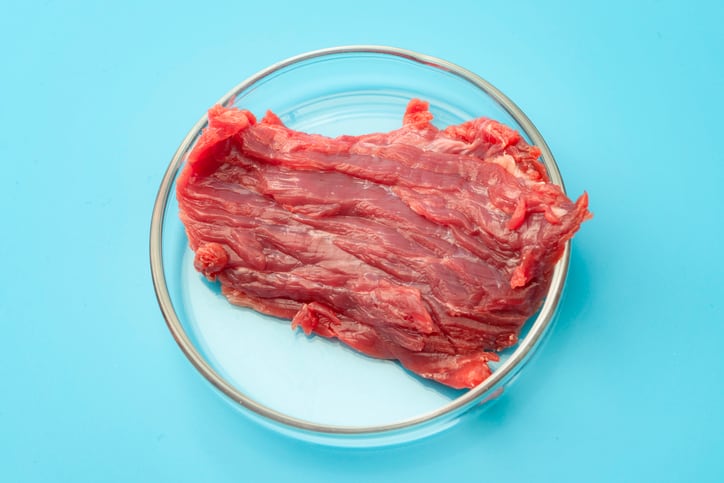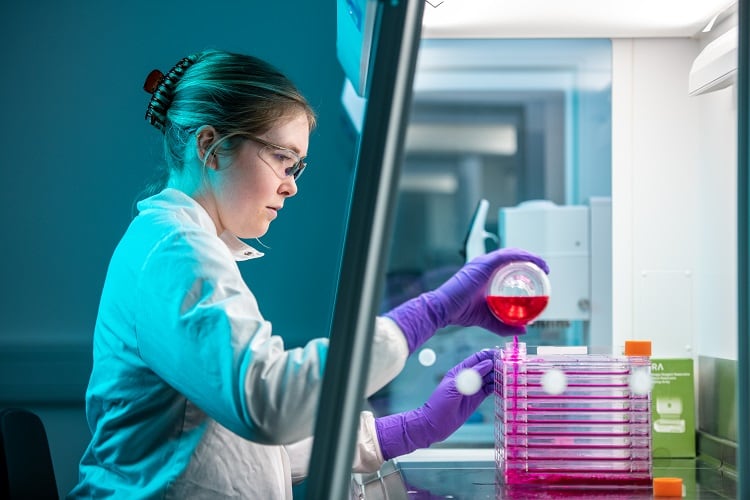Fresh on the heels of its announcement it has submitted an application to Swiss regulators to sell cultivated beef in the country, marking the first-ever application to sell cultivated meat in Europe, Israeli cultivated meat company Aleph farms has now revealed it has submitted a dossier to the UK’s Food Standards Authority.
“Approval of our submission will allow us to launch Aleph Cuts, the world’s first cultivated beef steaks, in the UK,” the company said.
Aleph Farms claims its Aleph Cuts brand is the world's first cultivated steak grown from the cells of premium Angus.
In Switzerland, Aleph’s go-to-market strategy envisages distribution and commercialization of Aleph Cuts through fine dining food service channels in Switzerland. The submission is part of its collaboration with Switzerland’s largest supermarket and meat manufacturer Migros.
Of its plans in UK, it told FoodNavigator: “Aleph anticipates that the review process will last between 12 and 24 months. More details about the planned introduction of Aleph Cuts in the UK will be provided soon.
"Food systems affect everyone. In order to advance a just and inclusive transition that makes these systems more sustainable and secure, collaboration should incorporate all stakeholders. We look forward to working closely with the Food Standards Agency to ensure full compliance with all safety requirements. Together, we can build trust with diners and provide them with new and delicious culinary experiences.”
UK regulatory process
After Brexit, the UK assimilated the EU’s novel foods regulatory framework into UK law. This means that, before a cultivated meat product can be sold in the UK, it must be approved by the Food Standards Agency (FSA). The approval process will include a thorough and evidence-based assessment of the safety and nutritional value of cultivated meat.
However, the UK Government has recognised that changes to the existing novel foods authorisation process could help bring foods with climate-mitigation potential, like cultivated meat, to market faster. Last month, the FSA published independent recommendations for how these reforms could be implemented.
The news of the UK submission was again welcomed by supporters of cultivated meat.
Seth Roberts, Policy Manager at the Good Food Institute Europe, said: “It’s great news that the UK has received its first application to sell cultivated meat. Once approved by regulators, British consumers will be able to enjoy their favourite beef dishes, made in a way that could slash climate emissions and create space for more sustainable farming. Cultivated meat represents a huge opportunity for the UK to enhance its food security and create future-proof green jobs.”
ProVeg International CEO Jasmijn de Boo added: “We are thrilled about the pace in which the cultivated meat market is advancing. Aleph’s second submission in two weeks is a reflection of how swiftly the alternative protein market is evolving, and how the food industry and civil society supports positive change towards a more sustainable food system."
They both stressed it is crucial that the UK stays on track with its planned reforms to the novel foods regulatory framework. “Several British cultivated meat companies are making great progress, but are considering launching their products overseas," warned Roberts. "The Food Standards Authority should accelerate constructive conversations with industry, scientific experts and consumer groups to inform a trusted, innovative framework for sustainable proteins that enables them to deliver on their climate benefits.”
De Boo agreed that legislation must now follow suit. "This development represents an opportunity for the UK and Europe to keep up with the times. In doing so, we also advocate that farmers and others involved in the food supply chain are well represented in enacting such solutions, offering them resources and funding, such as the UK Farming Innovation Fund, to help them transition toward more planet-friendly practices."
The UK Farming Innovation Fund is making over £14 million available for the farming sector to drive innovation and develop new practices to boost productivity and sustainability, according to the government.
Aleph Farms’ submission also comes just over a month after two cultivated chicken products were approved for sale following safety evaluations in the United States. Cultivated meat has been available in Singapore since December 2020. Tomorrow, 05 August also marks the 10th anniversary of the first-ever cultivated beef burger being presented in London by Dutch scientist Dr Mark Post.
Environmental benefits?
Peer-reviewed research shows cultivated meat could cut cause up to 92% less greenhouse gas emissions and up to 94% less air pollution, and use up to 66% less water and 90% less land than conventional beef. It can also be made without antibiotics, helping to reduce the risk of antimicrobial resistance.
Though a recent pre-print study out of the University of California, Davis, has claimed lab-grown meat is not inherently better for the environment thanks to highly energy-intensive production processes.





